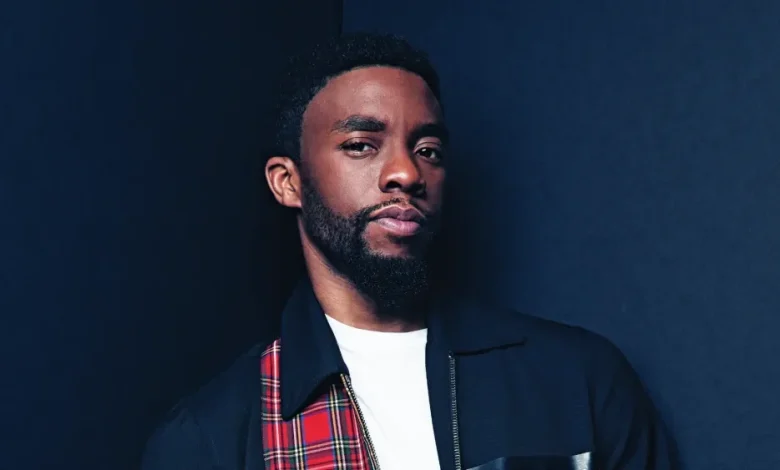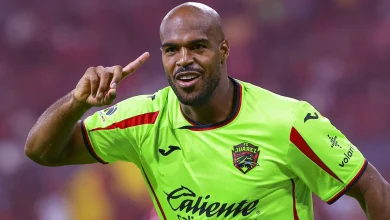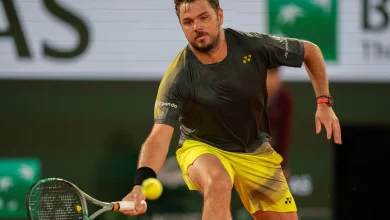Chadwick Boseman’s Star Gets a Prime Spot on the Hollywood Walk of Fame: ‘A Place of Prominence for a King’

On a starry January evening in 2018, Chadwick Boseman stepped out of a black car and onto the royal purple carpet outside the Dolby Theatre for the world premiere of his newest film, “Black Panther.” Director Ryan Coogler’s movie was hotly anticipated — particularly for its historical significance as the solo debut for Marvel’s first Black superhero, T’Challa, the rising king and superpowered protector of the Afro-futuristic nation of Wakanda.
“This is an epic experience,” Boseman told reporters, grinning widely as he looked out at Hollywood Blvd., blocked off for an assembly of A-listers dressed in their finest African garb.
But even with all the hype — the hashtag #BlackPantherSoLit had been trending since production began years earlier — no one could’ve fully imagined the cultural phenomenon that “Black Panther” would become. When Boseman returned for the 91st Academy Awards with his future wife Simone, the film had grossed $1.3 billion at the box office and made history as the first superhero movie to be nominated for best picture.
Now, more than seven years later, on Nov. 20, a red carpet will be rolled out on that famed stretch of sidewalk once again as Boseman gets immortalized with a star on the Hollywood Walk of Fame. Upon learning Boseman’s terrazzo and brass monument will be located near the same venue, his “Black Panther” co-star Lupita Nyong’o says reverently: “It means it won’t be missed. A place of prominence for a king.”
But this celebration is bittersweet, as Boseman — the man who also embodied baseball great Jackie Robinson (in “42”), soul legend James Brown (“Get On Up”) and Supreme Court Justice Thurgood Marshall (“Marshall”) — won’t be there to experience it. On Aug. 28, 2020, Boseman died following a four-year battle with colon cancer. He was 43.
“He is on an ancestral plane and the more we utter his name, the more his spirit stays alive,” Nyong’o says. “It’s hard to articulate without sounding grandiose. But there was something about him that you couldn’t explain why he moved you so much. It went through the screen and into so many people’s hearts.”
Simply put: Boseman was a man whose influence was somehow more than the sum of the legends he portrayed.
“There was just a longevity to his spirit that made him seem almost invincible,” Nyong’o says. “I think that’s what really shattered so many of our hearts because it hadn’t occurred to me that Chadwick could die.”
Boseman’s T’Challa in “Black Panther” became a global icon, symbolizing strength, honor and pride in African ancestry.
Walt Disney Co./Everett Collection
Indeed, Boseman’s death was shocking and heartbreaking, as he kept his diagnosis so private that many in the “Black Panther” fold, including Nyong’o and Coogler, were in the dark. But in the time that he had, and while he battled the progressing disease, the actor intentionally crafted a cinematic legacy that accomplished a mission he held dear: to dignify African American people with a wide array of stories about the culture to ensure that rich history is not overlooked or forgotten.
“Chadwick didn’t really do it for the accolades; he did it for how it would move people individually and societally forward,” Nyong’o says. “His art was in service to that.”
In the years since Boseman’s death, several memorials have been erected in his honor: His alma mater Howard University’s school of fine arts was reestablished in his name, and the performing arts academy in his hometown of Anderson, South Carolina, was also named for him.
Now, with his enshrinement on the Walk of Fame, Boseman’s fans will have another location to make a pilgrimage to, where they can pay their respects. “It’s apt because he’s been a significant contributor to Hollywood,” Nyong’o says. “It’s a symbol of legacy, which he deserves.”
Reminiscing on the project that brought them together, she adds: “Chadwick had an aura about him that was fit for a king. He was born to play that role [of T’Challa], and he brought his whole self to it. But, at the same time, working with him was pedestrian.”
Boseman, as those close to him know, was more man than myth. His collaborators felt that he was preternaturally gifted. Nyong’o could see that from watching him breathe life into Robinson or Brown on the big screen. But then she got an intimate look as they prepared for “Black Panther.” Making the movie was a “charmed time,” Nyong’o recalls, but “it was also a lot of work.” There was weight to the art they were making and though Boseman carried it well, that didn’t make the endeavor any less intense.
“He was a learner. He was observant. He rolled up his sleeves and did the work, and he was very generous,” she says, remembering how they practiced the nuances of the Wakandans’ Xhosa dialect side by side. “He wasn’t coasting through. He was finding it as much as we were, and he was doing it elegantly, of course, but he would blunder. So, you’re seeing a great person at work, but he doesn’t stop being human.” Nyong’o pauses for a moment, then adds, “He never stopped being human.”
Boseman starred as baseball legend Jackie Robinson in “42.”
Warner Bros. Pictures
“Chadwick Boseman” is a giant, but “Chad” was the guy who sang karaoke during a 48-hour stop in Korea like it was a private concert. (He performed James Brown tunes, naturally.) Another night, Nyong’o showed up for a house party at Boseman’s place. “I walked into this sea of folks dancing, the music going, the DJ playing and him in a corner with his boys drumming — sweating, like wet! It was such an incredible vibe,” she says with a smile. “He was in a flow state, and it was a moment of abandon.”
Minutes after hanging up with Nyong’o, a curious thing happens — I stumble on a mural of Boseman as Jackie Robinson and James Brown on the side of a building in West Los Angeles. The colorful wall art features a quote from Robinson: “A life is not important except in the impact it has on other lives.” And Boseman’s life was nothing if not impactful.
As much as he captivated audiences with his work onscreen (including his final two films, Spike Lee’s “Da 5 Bloods” and a starring role opposite Viola Davis in the film adaptation of August Wilson’s “Ma Rainey’s Black Bottom,” for which he was posthumously nominated for a best actor Oscar), Boseman has been saluted as a real-life hero for his charitable deeds off camera, including visiting pediatric cancer patients while battling cancer himself. They were both ways Boseman lived in his purpose.
The actor reflected on this idea when he delivered the 2018 commencement address at Howard University. During the speech, he told a story about a chance run-in with the legendary boxer Muhammad Ali while he was an undergraduate. He was walking through the yard when he caught a glimpse of the legendary athlete and activist coming toward him. Ali caught his eye and raised his fists in a playful challenge. Boseman played along, taking up a similar stance and pretending to be a worthy opponent. Then, in a flash, the brief interaction was over. “I walked away floating like a butterfly,” Boseman said.
It wasn’t until years later, when Boseman was fired from one of his earliest TV gigs (a role on “All My Children”) after questioning a stereotypical storyline, that he’d recognize the deeper significance of that interaction. “I realized he was transferring something to me on that day. He was transferring the spirit of the fighter to me,” Boseman told the graduates. “Sometimes you need to feel the pain and sting of defeat to activate the real passion and purpose that God predestined inside of you.”
Boseman called purpose an “essential element of you.” He concluded, “It is the reason you are on the planet at this particular time in history.” In his case, by questioning the powers that be, he said, “a different path opened up for me. The path to my destiny.”
It was far too brief, but by walking in that purpose, Boseman’s destiny was fulfilled.
Boseman was nominated for an Oscar, a Golden Globe, a SAG Award, a BAFTA and a Critics Choice Award for his performance in “Ma Rainey’s Black Bottom.”
Netflix





